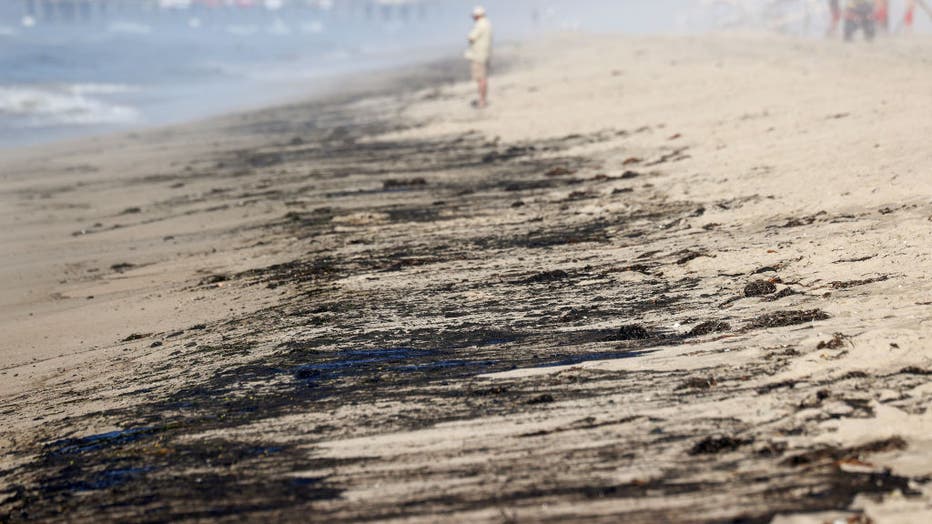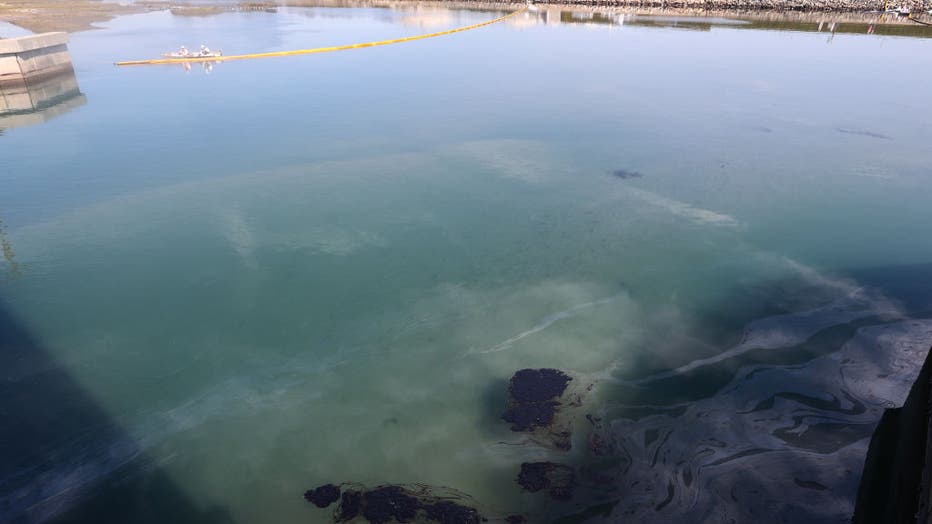California oil spill: Wetlands may face ‘ecological disaster’ from pipeline failure
Huntington Beach oil spill closes beaches, kills wildlife
One of the largest oil spills in recent Southern California history affected beaches and killed wildlife, while crews worked Sunday to contain the crude before it spread further into protected wetlands. At least 126,000 gallons of oil spilled into the waters off Orange County. Huntington Beach Mayor Kim Carr called the situation 'absolutely devastating.'
HUNTINGTON BEACH, Calif. - Some Southern California wetlands could face ecological impacts after a pipeline failed, causing a 126,000-gallon oil spill from an offshore rig in the waters off Huntington Beach this weekend.
Crude was no longer leaking on Sunday, according to the head of the company that owns the facility.
Amplify Energy CEO Martyn Willsher said Sunday that divers are still trying to determine exactly where and how the spill happened, but the pipeline has been shut off. He says all remaining oil in the line has been suctioned out.
The oil slick originated from a broken pipeline connected to an offshore oil platform known as Elly, Orange County Supervisor Katrina Foley said on Twitter. Elly is connected by walkway to another platform, Ellen, located just over 8.5 miles off Long Beach and operated by Beta Operating Company, according to the federal Bureau of Safety and Environmental Enforcement. Beta and its parent company, Houston-based Amplify Energy Corp., didn’t immediately return phone messages and emails seeking comment.
Some birds and fish were caught in the muck and died, Orange County Supervisor Katrina Foley said. But by early afternoon Saturday the U.S. Coast Guard said there so far was just one ruddy duck that was covered in oil and receiving veterinary care. "Other reports of oiled wildlife are being investigated," the Coast Guard said in a statement.
According to FOX 11 Los Angeles, Huntington Beach Mayor Kim Carr described the situation as a "potential ecologic disaster," and said some of the oil had reached the shore and was impacting the Talbert Marshlands and the Santa Ana River Trail.
RELATED: Major oil spill closes beaches, kills wildlife, cancels air show at Huntington Beach
CA Dept of Fish and Wildlife give update on oil spill
Officials with California Department of Fish and Wildlife held a news conference to talk about the oil spill off the Southern California coast.
"Our wetlands are being degraded and portions of our coastline are now covered in oil," Carr later said during a news conference Sunday. "Unfortunately, as a result of this oil spill, we are starting to see oil-covered fish and birds washing up along our coastline."

HUNTINGTON BEACH, CALIFORNIA - OCTOBER 03: A person stands near oil washed up on Huntington State Beach after a 126,000-gallon oil spill from an offshore oil platform on October 3, 2021 in Huntington Beach, California. The spill forced the closure of
"The spill has significantly affected Huntington Beach, with substantial ecological impacts occurring at the beach and at the Huntington Beach Wetlands," a city statement said.
City officials said they’re doing everything to mitigate an ecological disaster with skimming equipment and booms being deployed to prevent the inflow of oil into the Bolsa Chica Ecological Reserve and Huntington Beach Wetlands.
Oil Slick Reported Off California Coast Following Massive Spill
Crews worked to contain the damage from a massive oil spill off the Orange County coast in California on Sunday, October 3, as officials warned of a potential ecological disaster. (Credit: Nina Rodriguez Glover via Storyful)
"The coastal areas off of Southern California are just really rich for wildlife, a key biodiversity hot spot," said Miyoko Sakashita, director of the Center for Biological Diversity’s oceans program.
RELATED: Kilauea eruption: Video captures lava spewing from Hawaii volcano
The effects of an oil spill are wide-ranging, environmentalists said. Birds that get oil on their feathers can’t fly, can’t clean themselves and can’t monitor their own temperatures, Sakashita said. Whales, dolphins and other sea creatures can have trouble breathing or die after swimming through oil or breathing in toxic fumes, she said.

HUNTINGTON BEACH, CALIFORNIA - OCTOBER 03: Cleanup workers attempt to contain oil which seeped into Talbert Marsh, which is home to around 90 bird species, after a 126,000-gallon oil spill from an offshore oil platform on October 3, 2021 in Huntingto
According to the California Department of Fish and Wildlife, the Bolsa Chica Ecological Reserve is an approximate 1,300-acre coastal estuary with habitats including open water, mudflats, salt marsh, coastal dunes, seabird nesting islands, riparian, and freshwater marsh. State officials said the reserve is also home to more than 200 avian species which attracts birders and photographers.
Marine life is also found on the reserve with over 60 species of marine fishes such as marine invertebrates, and occasionally the California sea lion and green sea turtle.
Multiple rare and endangered plants are on the reserve including California seablite, woolly seablite, coast woolly-heads and red sand verbena.
RELATED: Fall foliage: Climate change affecting autumnal activity, experts say
The reserve underwent a major restoration in 2006 that included the creation of a new marine basin and an additional 923 acres.
Further down the coast, the Upper Newport Bay Ecological Reserve is a 752-acre property consisting of salt marsh, mudflat, and marine habitats, according to state officials. Local officials say it’s a popular spot for shorebirds and waterfowl.
Newport Beach city officials are also advising residents and visitors to avoid contact with ocean water and oiled areas of the beach.
The spill comes three decades after a massive oil leak hit the same stretch of Orange County coast. On Feb. 7, 1990, the oil tanker American Trader ran over its anchor off Huntington Beach, spilling nearly 417,000 gallons of crude. Fish and about 3,400 birds were killed.
In 2015, a ruptured pipeline north of Santa Barbara sent 143,000 gallons of crude oil gushing onto Refugio State Beach.
The Associated Press contributed to this report. This story was reported from Los Angeles.

